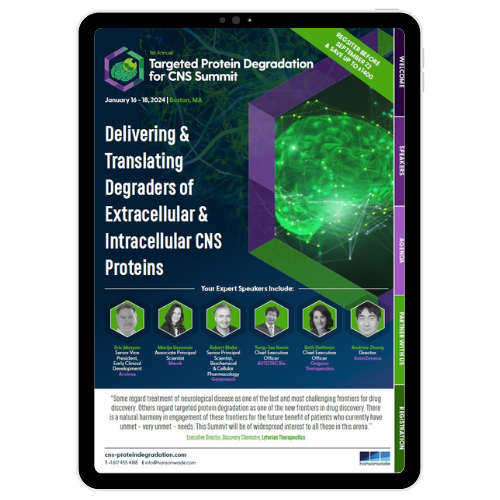8:00 am MORNING REFRESHMENTS
8:50 am Chair’s Opening Remarks
DESIGNING OPTIMIZED DEGRADER MOLECULES FOR MAXIMUM PENETRATION OF THE BBB & EFFICACY AT THEIR TARGET SITE WITHIN THE CNS
9:00 am Innovating the Design & Synthesis of Bifunctional Chemical Probes for Understanding CNS Therapeutic Concepts
Synopsis
- Enabling rapid library synthesis and hit finding for bifunctional molecules to test CNS disease concepts
- Developing new chemistries to aid the exploration of CNS-compliant chemical space for induced proximity modalities
- Design and profiling of cellular chemical probes to identify actionable targets and effectors in the CNS
9:30 am Programmable Modulators of Undruggable Targets via Generative Language Models
Synopsis
- Generative language models can design selective peptide binders to any target, including those that are disordered and lack binding pockets
- Peptide binders can be fused to E3 ubiquitin ligases or deubiquitinases, driving programmable target degradation of proteins such as GFAP and mHTT and stabilization of proteins, such as p53
- These peptide-enzyme fusions can be readily encapsulated as mRNA in LNPs or encoded into AAVs for therapeutic delivery
10:00 am MORNING BREAK & NETWORKING
10:30 am NEK7 Molecular Glue Degraders: Design of Potent and Selective Glues to Target Neuroinflammation
Synopsis
- Role of NEK7/NLRP3 Inflammasome in Neuroinflammation
- CNS penetrant NEK7 Molecular Glue Degraders
11:00 am Round Table Discussion: Breaking Barriers: Designing Optimized Degrader Molecules for CNS Targets
Synopsis
Selection of Target Proteins:
- What criteria should be used to select target proteins for degradation in neurodegenerative diseases?
- How do we prioritize targets based on disease relevance and druggability?
Design and Optimization of Degrader Molecules:
- What are the key considerations in designing effective PROTACs (Proteolysis-Targeting Chimeras) and molecular glues?
- How can we optimize the linker length, E3 ligase ligands, and target-binding moieties to enhance degrader efficacy and selectivity?
Mechanistic Insights and Structure-Activity Relationships (SAR):
- How do the structural features of degraders influence their mechanism of action and degradation efficiency?
- What are the latest advancements in understanding the SAR of protein degraders?
12:15 pm LUNCH
REVIEWING DEVELOPMENTS IN PRECISION TARGETING OF NEURODEGENERATIVE PATHWAYS FOR CNS DISEASES: TARGET SELECTION, PATHWAY ANALYSIS & ENGAGED MECHANISMS
1:15 pm Protein Folding Pathways Across Physiology & Therapy
Synopsis
- Pharmacological Protein Inactivation by Folding Intermediate Targeting (PPI-FIT), the approach could represent a new paradigm for drug discovery
- Targeting Protein Folding Pathways: Our research highlights the therapeutic potentials of targeting protein folding pathways to treat neurodegenerative diseases
- Mapping Cryptic Phosphosites in the Human Proteome: the discovery of cryptic phosphosites in proteins
1:45 pm Successful Use of Phenotypic Screening for Protein Degraders Targeting Neurodegenerative Diseases
Synopsis
- Keys for high-throughput screening
- Expeditious characterization of hits using primary human cell models
- Accelerating drug discovery using PK/PD models
2:15 pm AFTERNOON BREAK & NETWORKING
2:45 pm Successes and Challenges in Addressing Protein Degradation for Neurodegenerative Pathways
Synopsis
- Updated information on targets in the pipeline
- Landscape of current challenges
- Outlook and opportunities for the future
3:15 pm Tau Degrader for Alzheimer’s & Primary Tauopathies: From Platform Development to Translation
Synopsis
- Overview of misfolded protein aggregates for targeted protein degradation
- Review of technologies and pathways being pursued for tau degrader drug development
- Future directions of translating tau degrader to drug in clinics
3:45 pm Round Table Discussion: Approaches to degrade proteins with molecular glues, and their therapeutic role
Synopsis
- Novel studies in degrading pathogenic proteins by recruiting them to E3 ubiquitin ligases via small molecules that remodel protein surfaces to induce non-endogenous E3–substrate interactions
- Functional genomics, structural, and computational studies to identify how a small molecule degrades a B-cell lymphoma target by polymerizing it
- Polymerization potential of other transcription factors and how it opens avenues to target “undruggable” proteins
4:45 pm Chair’s Closing Remarks
4:50 pm END OF CONFERENCE
Download the Full Event Guide for more information on:
- 20+ Biotech & Pharma Speakers
- 4 Interactive Deep-Dive Workshops
- 6+ Hours of Networking
- & Much More!

